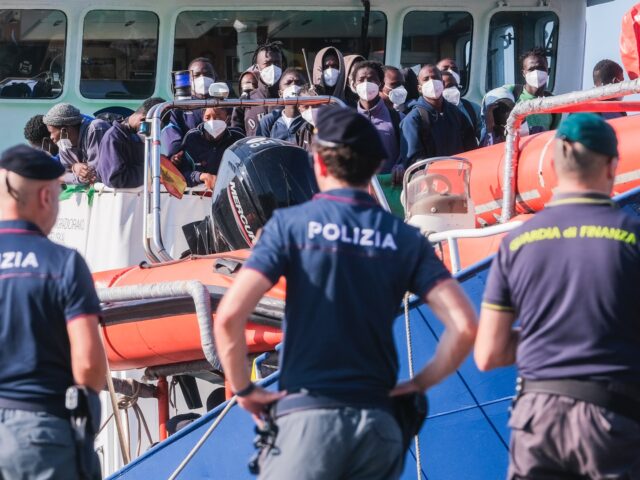Italy is on pace to see a record number of illegal boat migrants land on its shores as arrivals surged by 150 per cent to the country over last year.
The European Border and Coast Guard Agency, Frontex, revealed on Friday that detections of illegal boat migration in the central Mediterranean route have increased by 137 per cent to 65,571, with 15,125 making the perilous people smuggler-controlled journey in June, an increase of 85 per cent over the previous month as weather conditions improved.
The number of crossings on the migrant route is the most recorded during the same time period since 2017. According to the EU border agency, the main countries of origin of the migrants are Egypt, Guinea, and the Ivory Coast.
While all other major illegal migrant routes have seen a decline over the past year, the increase seen in the central Mediterranean has meant that overall the EU has seen its highest number of boat migrants since 2016 and ten per cent more than last year, with 132,370 illegals making their way to Europe since the start of the year.
Italy has been particularly hit hard by waves of migrants, with 73,865 boat migrants reaching its shores in 2023, and increase of 150 per cent over last year when 31,671 landed. If the current pace continues, the Italian newspaper Il Giornale calculates, the country is set to break the record number of landings in 2016 at the height of the European Migrant Crisis when over 181,000 boat migrants arrived in the country.
Meloni Govt Declares State of Emergency as Italy Sees Illegal Boat Migration Quadruplehttps://t.co/haJT8nzbLe
— Breitbart London (@BreitbartLondon) April 12, 2023
Commenting on the growing crisis in the Mediterranean, Frontex Executive Director Hans Leijtens told Milan’s Corriere della Sera newspaper that the “modus operandi of traffickers has changed.”
“We see two different types of action. One is based on the use of old fishing boats, very often from Egypt: they sail empty to Libya and then are filled to capacity to increase profit. On the other hand, makeshift metal boats arrive from Tunisia with small engines. Instead of having a vessel with 600 people on board, you have very unsafe small units with around 30 people.
“Traffickers don’t just send one or two at a time to Lampedusa but also 30 or 40 to mislead the Coast Guard. Either way, search and rescue is a huge challenge.”
“The central Mediterranean is a priority for Frontex,” Leijtens continued. “We have to fight the traffickers. The trade in human lives has no dignity. It’s not enough to catch the small fish, but to dismantle the entire organization. We need to step up cooperation between Member States, agencies across Europe, Europol, and Interpol and try to adopt some sort of global approach to combat these liquid networks.”
According to the report published by Frontex, nearly 1,900 migrants have gone missing in the Mediterranean just the month of June alone, with the vast majority disappearing along the Central Mediterranean route.
Tunisia Demands International Bailout to Slow Illegal Migration to Europehttps://t.co/cZSIsshpwx
— Breitbart London (@BreitbartLondon) June 11, 2023
It comes as Italian Prime Minister Giorgia Meloni travelled to Tunisia alongside outgoing Dutch Prime Minister Mark Rutte and European Commission President Ursula von der Leyen to hold talks with Tunisia’s autocratic president, Kais Saied, in the hopes of signing a memorandum of understanding on migration by Sunday.
Illegal migration from Tunisia, specifically from the coasts of Sfax and Bizerte, has been a major driver of the increased flows of migrants across the Mediterranean this year.
While many point to the economic calamity currently befalling Tunisia, with the government even struggling to pay its employees and citizens struggling under rampant inflation, this is only a partial explanation for the upsurge in migrant boats setting sail from its coastline. Indeed, the majority of those heading to Italy from Tunisia are in reality Sub-Saharan Africans who are unaffected by the economic situation in the North African country.
For Prime Minister Meloni, who was elected last year largely on the basis of promises to cut illegal migration, the summit in Tunisia may have significant political implications.
The populist leader has been arguing on behalf of the Tunisian government on the world stage, calling for funds from the IMF — which are currently being held up until the Saied government implements reforms — to be released in order to prevent the country from going bankrupt, which would likely see illegal immigration surge even more. It is unclear if such overtures will be enough to come to a deal with Saied, however, given his past statements declaring that he did not want to be anyone’s “coastguard”.
Italy Risking ‘Ethnic Replacement’ with Low Birth Rate and Mass Immigration, Minister Warns https://t.co/JweQvcg4iw
— Breitbart London (@BreitbartLondon) April 20, 2023

COMMENTS
Please let us know if you're having issues with commenting.